11 Memorable Insights From My India Trip
Over the last month, I traveled across India, sitting in dozens of circles, and broadly tilling the soil with the spade of our values. My stops included Bangalore, Hyderabad, Surat, Chennai, Baroda, Bombay, Coimbatore, Rajkot, Pune, and Ahmedabad. My schedule rested entirely in the hands of ServiceSpace anchors. With no budget, agenda or ask of any kind a packed itinerary took shape. No matter the format, we aspired to deepen engagement. It's impossible to stockpile the value that gets generated. Like a river it flows irrepressibly into the sea of the commons. Audrey’s reflections on-the-go capture this well: Moved by Love from Surat to Mumbai to Pune.
"The sole purpose of my work is to connect heart to heart," said Vinoba Bhave. In many ways, this approach has been our anchor as well. We try and hold space for a field of love, where people's minds and hearts can meet as one. Everything else is a ripple.
In a sense, this whole trip is a ripple of 16 years of ServiceSpace. Thank you for giving me the opportunity to stand on the foundation of your work. Below are a handful of insights from the road.
1."Everybody is Good at Something. And Everyone Can Be Great at Giving."
The India Inclusion Summit is a rare-for-its-kind gathering that shines a light on amazing differently-abled folks. The emcee was blind, speakers were often in wheelchairs, and the 1200-person-event was run by volunteers. Our dear friend Ferose, (whose son's autism inspired his path) had titled the conference: "Everybody is Good at Something". My talk was an invitation to deepen that to, "Everyone Can be Great at Giving." We tend to think of integrating people with disabilities primarily in reference to jobs. Now, can we build a future that also includes them as change-makers, kindness agents, and love warriors?
At one point, a group of five (above) youngsters came to me for selfies. One among them says, "Sir, today I feel like I have received a lot in life. It's time I give back. Can you help me do that?" She was blind. Not long after, a posse of five pumped-up youngsters came over, and in the midst of our upbeat conversation, took selfies, like the one above :). Many in the crowd had been touched by ServiceSpace's work, even prior to our in-person connection. Now in the works is a MasterChef-style contest for the blind, a 21-Day Inclusion Challenge, and a "Moved by Love" retreat for specially-abled love warriors.​
2. “Do An Act of Kindness. Reconnect with Your Roots. And Then Your Heart Will Guide You."
In Chennai, a reporter from The Hindu came by to do a story. Mid-interview, she stops. "So, you really believe that people are fundamentally good?" "Yeah," I say. "Even that bus conductor who seemed so hardened by everyone's negativity?" "Akila," I replied,"forget about writing this story. Go give a box of sweet to that bus conductor and you'll know what I mean." She did, and then opened her article -- His Experiments With Generosity -- with this very quote. :)
My travels were sprinkled with press interviews. And I always try and approach them all as one-on-one conversations with volunteers. "I want to bring this spirit to my community. What should I do?" asked one guy. "It's either now or never," I told him, "Just do an act of kindness, reconnect with your roots, and then your heart will guide you." An accomplished cartoonist, he spontaneously grabbed a piece of paper, drew a swift sketch and gifted it to me: "Thank you. For giving me the gift of now." Another reporter coyly asked to hug me, another told me about her daughter's kindness challenge. With yet another good news outfit, I felt moved to challenge them directly: "We could do this story, or start a movement." They chose the latter. Now we are planning to build an open-source bank of good news, and host a joint retreat with leading positive news reporters.
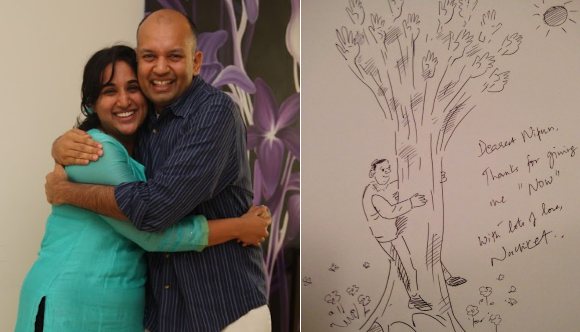
Journalists are good at writing, but everyone can be great at giving. :)
3. "Generosity has its limits"...Or does it?
At a public talk with 300 business executives, after a standing ovation, a man takes the mic for a question. "This is all wrong," he says, and launches into a negative comment that continues for a bit, "Try talking about all this to a terrorist. He'll just slit your throat!" His primary point was this: Generosity has its limits.
My response was to share Subba Rao’s story. When a group of bandits harasses travelers, most worry for their safety. But if you're Subba Rao, you follow the bandits up to their mountain caves. You befriend them, armed with nothing but a bag of sweets and a heart full of love ... within the year, you inspire 550 bandits to trade in their weapons for the scripture of their choice and a suitable jail term for their crimes. Subba Rao never got the memo about the limits of love. I talked about his mentor Vinoba too. “We are swimming in many such real-world examples. Not mythical stories. People -- like Subba Rao, or Dr. Ariyaratne in Sri Lanka. What gives them this strength? I don't know. But they repeatedly remind us that we all have this capacity within." Later that same questioner took the mic again, "Sir, you have changed my mind." By the end of the night, we were talking about meditation.​ :)
4. "Spirituality is Not Taught. It is Caught."
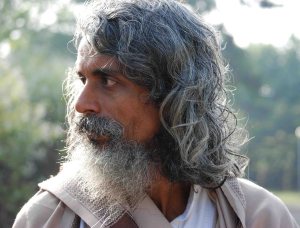 At our wait-listed Maitri Milan retreat, a man from the Himalayas walked in unannounced. Joseph is a monk, with no mobile phone, no email address, no physical address. You can't reach him in any of the usual ways. "The Himalayas moved me to join this gathering," he said simply, in our opening circle. If it's permitted to call such monks your friends, then I would say that we are great friends. He loves everything we do and stand for.
At our wait-listed Maitri Milan retreat, a man from the Himalayas walked in unannounced. Joseph is a monk, with no mobile phone, no email address, no physical address. You can't reach him in any of the usual ways. "The Himalayas moved me to join this gathering," he said simply, in our opening circle. If it's permitted to call such monks your friends, then I would say that we are great friends. He loves everything we do and stand for.
In one circle he shared this story about his teacher. "When my teacher was 17, he found himself in a class taught by Gandhi. Outspoken by nature he often raised his hand to share. Gandhi noticed and called on him. 'Sir, all this 'Raam Rajya' stuff that you talk about is some kind of utopia -- it isn't practical. It won't work.' Gandhi gently responds, 'What other choice do we have?' To which, the astute 17-year-old says, "We do have a choice that will work -- communism." He had read Das Kapital and many other related texts. In response Gandhi folded his hands, bowed a little, and asked the young man, 'Just as I permit you to believe whatever you'd like, would you also permit me to believe in utopia?' In tug-of-war, you expect resistance when you are pulling with all your might -- but here, in a moment, Gandhi just gave up the rope. His humility transformed the young man, and he ended up staying with Gandhi for six months -- and then spent the rest of his life in serious cultivation."
So many people ask how we can change others. I think Gandhi's answer was simple -- first love the other as your brother and sister, and the rest will follow.​
5. "The Root of Education is Reverence. The Fruit of Education is Service."
In Bombay I stopped in for a casual conversation with Teach for India's leadership council. It ended up being a powerful hour of brainstorming educational models. "When the bell rings in class, all the students race out. What will it take to flip that? To have students race to class, when the bell rings?" The answer, as many educationalists see it, is to catalyze inspired teachers who love their students. But how do we do that?
One fundamental problem is that we aren't equipped to create social change without money. Instead, what if we inspired people not through money, but through inner transformation? I serve, because I can see the source of external suffering in my own being. The more I serve others, the more I purify myself. The more I transform myself, the more I want to serve. It's a virtuous loop, that keeps regenerating itself. Dada Vaswani's words capture this eloquently: The root of education is reverence and its fruit is service. If we get the roots right, the fruits will naturally become seeds for the future. Swami Vivekananda, Gandhi, Mother Teresa and many others counted on this kind of subtle capital to sustain their movements.
6. "Without Inner Transformation, Service Becomes De-sensitized."
We held a first-of-its-kind retreat with founders of grassroots NGOs. Each one shared powerful stories of what sparked their journeys -- whether it was holding a 2-year-old who'd been raped by an army soldier, or becoming a parapelegic at a young age, or finding oneself on the brink of suicide. True courage and heroism shone through their shares.
 Sister Lucy was among those in the circle. In 1991, a pregnant woman with an abusive husband, showed up on her doorstep, fearing for her life. Sister Lucy had promised to try and do something for her the next day, but, "that very night, her husband, in a drunken rage, set her on fire. I actually saw the blazing woman and heard her shrieks of agony. We put the fire out and took her to a hospital but she died of 90 degree burns and with her died the seven-month-old fetus. I was devastated." She started Maher, to serve those in need. Today, through her 29 homes across India, she does pioneering work and is lovingly referred to as the "Mother Teresa of Pune".
Sister Lucy was among those in the circle. In 1991, a pregnant woman with an abusive husband, showed up on her doorstep, fearing for her life. Sister Lucy had promised to try and do something for her the next day, but, "that very night, her husband, in a drunken rage, set her on fire. I actually saw the blazing woman and heard her shrieks of agony. We put the fire out and took her to a hospital but she died of 90 degree burns and with her died the seven-month-old fetus. I was devastated." She started Maher, to serve those in need. Today, through her 29 homes across India, she does pioneering work and is lovingly referred to as the "Mother Teresa of Pune".
The two women who convened this remarkable group had been galvanized by an overheard remark. "When I first came in to the non-profit world and saw someone referring to a dying man as a documented file, I was shocked. Then imagine my surprise, when I started the doing the same thing, three years later." Coming together in an agenda-less, ServiceSpace sort of way had a remarkable effect of re-sensitizing them to their work. The transformation was palpable.
We ended our time with the 'Three Steps and a Bow' practice inspired by Rev. Heng Sure. Sister Lucy (who has physical constraints) preferred to be last, since she didn't want to slow anyone down. "I didn't think I was going to bow," she later said. "But I kneeled down in prayer, and then just bowed. Then I did again. And again. And again, all the way to the end." Repeatedly, she thanked us for "reminding her about love" and she has since committed to starting all her days with prayer.
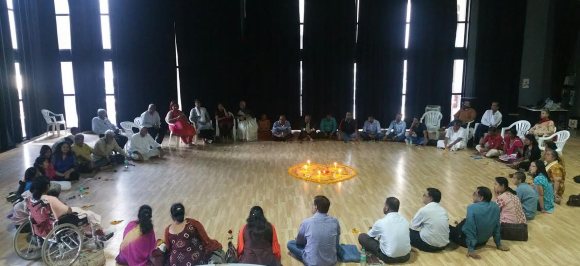
7. "Can Profit and Love Co-Exist?"
Circles of sharing are innate to all ServiceSpace gatherings. In Surat, over 50 people came together for a day-and-a-half. One of them was Saavji-bhai. With just a 4th grade education, Saavji-bhai is one of the biggest diamond merchants in the country. And he's known for his philanthropy -- most recently, he gifted cars to all his employees for Diwali. (He's now working on engaging his 7000 staff with acts of kindness. :)) So, it was understandable that during one of the breakout sessions, he asked the question: "Do you think profit and love can co-exist?" The circle anchors responded, in true ServiceSpace style, "Let's hold the question." To which Saavji-bhai retorted, "I don't want a certificate for my question, I want an answer." :)
At the end of our retreat, during which most people were moved to tears of transformation, Saavji-bhai was sitting next to me during lunch. "So, Saavji-bhai, what about that question of yours. Did you find a helpful response?" He replied, "No, I didn't find an answer. But in this field of love, the question itself has evaporated."
Circles of sharing are innate to all ServiceSpace gatherings. In Surat, over 50 people came together for a day-and-a-half, and our opening circle of sharing went on for more than three hours! A strong sense of stillness and presence pervaded the space -- and would stay with us till the end.​
8. "Guru of None. Disciple of All."
The last time I met Dada Vaswani, he gently (but persistently) invited me to stay at his ashram on my next trip. So this time, I spent a night there. In the morning, Dada changed his schedule to meet with us in his residence. We asked to include 60 of our local Pune friends, and he kindly obliged. The atmosphere was charged. Many, even those meeting him for the first time, found themselves in a quiet stream of tears. The content was great too. :)
To conclude our time together, we were each gifted a goodie bag that included his biography -- Guru of None, Disciple of All. Dada's public gatherings easily number in the thousands, and his disciples often go into a devotional fervor. A mere glance, a kind word of blessing, a touch on the head can change lives, they say. Streets are named after him, celebrities point to him as their inspiration, spiritual leaders speak glowingly of his wisdom. Yet, Dada explicitly declares himself: Guru of None, Disciple of All. It's a very interesting paradox.
As a part of our Gandhi 3.0 vision, I often speak about many-to-many. In a room full of 50 people, one-to-many creates 50 connections; one-to-one creates 1225 connections; and many-to-many creates 100 million trillion connections. If you are not trying to keep anything for yourself, clearly, many-to-many is the way to go. Yet, there are many layers to this. To start with, at least two layers: matter and mind. At the physical level, in today's era, one can organize in all three ways. But the infinitely more potent part is to organize in many-to-many way at the level of mind. Then, one might be a guru in the field of matter, but a disciple of emergence from the lens of the mind. With people like Dada, or his friend the Dalai Lama, one senses that they are clearly anchored in the field of many -- even if the world frames them as a guru. It's hard to draw those distinctions on paper, but it can be easily felt in the field of presence.
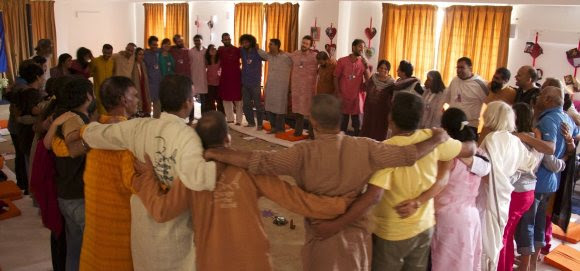
9. "Gandhi Didn't Create the Movement. The Movement Created Gandhi."
All too often, we see money as wealth. Sure, money is an expression of wealth, but there are so many other forms of capital. Social capital, trust capital, nature's capital, subtle capital of love, cultural capital and so on. In today's society, changemakers typically start a labor of love project and only have one pathway for maturation -- financial sustainability. Are there other, perhaps far more robust, pathways to sustainability than financial markets? When St. Francis of Assisi declared, "It is in giving that we receive", is that just an approximation or is he proposing an alternative? December 18th-20th sixty changemakers came together for our third Startup Service retreat, to frame their individual projects in the light of these questions. The promise wasn't to arrive at conclusive answers, but rather to support each other (and society) in holding these important questions. And other questions like these that were generated by the volunteers: Are our designs mindful of multiple forms of capital? What are our creative constraints? How can we tap into many-to-many potential? Are we leading with inner transformation? Can we operate without an exit strategy? (That is, are you comfortable doing this project forever?) How can we create value, only with what we have? What is our core purpose? Are we holding paradoxes? What will our experiment look like in 20 thousand years?
By the third day, the transformations were profound! Anil (who presented an engineering innovation) turned his entire model around, from traditional entrepreneurship to a community based pay-it-forward approach; Aabid spoke eloquently about the shift from Microsoft to farming; the young film star, Divyang, candidly shared his journey from leading with need to leading with inner transformation. One participant, who runs a $26B business, declared his intention to volunteer for a month to cultivate a different form of capital. Another couple, who runs GAP for poverty elimination, is radically shifting their model to include "love".
No one was trying to creating these shifts, they simply emerged.​ I sense that's how it works for all great change in the world. Gandhi didn't create the field, but rather it was the field that allowed Gandhi to emerge. Our job, whether in times of Gandhi or any other time, is the same -- to live in deep alignment with our values.
10. "If You Charge for Your Service, the Healing is Incomplete."
.JPG)
I opened with the story of Ishwar Patel. "Yes, he built 400 thousand toilets, initiated more than 120 organizations, and changed the face of sanitation in this country. But it wasn't how much he did, it was how he did it. At his funeral, his wife noted that he had never gotten angry with her in all their years of marriage -- not even once! His daughter-in-law shared how, decades ago, in the midst of a high-fever she set out to sweep and mop their home. As she was sweeping, she noticed a quiet hand mopping right behind her. It was Ishwar-kaka. They never spoke about it, but that simple gesture communicated volumes about who he was. The way he lived, and the many remarkable anecdotes around his death, are testimony to who Ishwar Patel became through his external service. It wasn't just that he changed the face of sanitation in the country, he changed himself."
Then, I spoke about how Ayurveda can be an instrument not just to heal the body -- but to repair the fractured gaps between people, and perhaps our own hearts. What if every personal healing session can embody a cultural shift from transaction to trust? Can we offer Ayurveda as the priceless gift that it is? For a healer, this is very natural approach, because each will tell you that nature is what does the healing and that healer merely facilitates the process.
Later Ramkumar, an accomplished leader of the movement, shared a quote from the sacred Ayurvedic texts that explicitly states: If you charge for your services, the healing is incomplete. Ayurvedic practitioners are expected to give the gift of healing without any strings attached (and certainly without price-tags) but we have just forgotten to evolve these models with the evolution of our transactional markets. It is now time to turn back the tide. :)
11. "Why Negotiate with Nature?"
After constantly being around so many people, and being in different beds every other night, I returned home last week. Guri tells me that during one of those jet-lagged 3AM moments, I looked at the "Namaste" quote by my bedside and launched into an imaginary circle of sharing, saying, "Just speak from your heart." :)
Acting and speaking from the heart is a deeply transformative process, because one has to discern what the heart is actually saying. That capacity isn't a function of will-power, but rather is borne of internal equanimity.
One of the great blessings of this trip included intimate participation from Arun Dada -- an 83-year-old Gandhian, who joined Vinoba at the age of 20. At 19, he seriously dislocated his jaw. Doctors urged him to take general anesthesia prior to surgery. When he said he didn't need the anesthesia, they thought he had lost his mind. But he insisted, saying: "If I moan even the slightest bit, you can give me anesthesia." They inserted a small pin to test him. No sound, not even a flinch. The pin went in deeper, deeper, and then all the way. Not a sound. They completed the surgery, and the 19-year-old was steady as a rock. Three months later, they removed the pins, and it was the same thing. Rather flabbergasted, the doctors asked him: "Arun, why are you opposed to anesthesia?" "Oh, I'm not opposed to it. I just want to experience sensations exactly the way nature offers them. Why should I negotiate with nature?" Over the next 64 years of his life, that man (who married and raised two kids) never -- ever -- sold his labor for money. "Nature will give me whatever I need, even if that means suffering," he says. Every aspect of his life -- to this day -- is a gift that is offered to, and accepted by him. He simply doesn't negotiate with nature.
Arun Dada's equanimity beams at you through his radiant love. All good that is bestowed upon him, he pays forward. He sings songs, he shares stories, he smiles from a distance. He quietly blesses, without ever trying to.
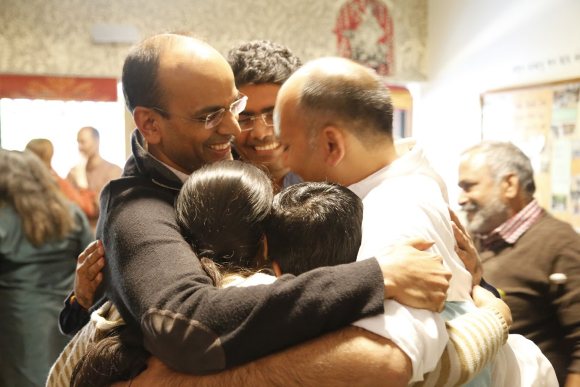
At the Awakin Hosts retreat, with 45 circle hosts from around South Asia, we all shared stories of turning our living rooms into spaces of service. In one of the breakouts, we spoke of an inspiring fellow who lives on 11 dollars a month, courtesy of the kindness of his village community. He wanted to start an Awakin Circle in his village, but didn't have the space. So he went to a funeral site, and began to clear a corner where people dumped trash. A few local youth joined in, and they started a weekly circle. Pretty soon, they started a kindness drive and various local events in the village. During Indian New Year, two months ago, 1200 folks gathered in that space and shared a 15-minute period of silence.
Something out of nothing. Fullness out of emptiness. Simply coming together unlocks an unseen potential in the matrix. That seems to be the Tao of ServiceSpace.
It's amazing how much goodness can be packed into a month of our existence. I feel full. Anyone who feels such an overflowing of gratitude would want to do this work forever. I certainly do.
Posted by Nipun Mehta on Dec 30, 2015
SHARE YOUR REFLECTION
39 Past Reflections


On Dec 30, 2015 Trishna Shah wrote:

On Dec 30, 2015 Aryae Coopersmith wrote:

On Dec 30, 2015 Zilong wrote:

On Dec 31, 2015 Hari Varma wrote:

On Jan 2, 2016 sanchi wrote:



On Dec 15, 2018 Neelam Mandhani wrote:
































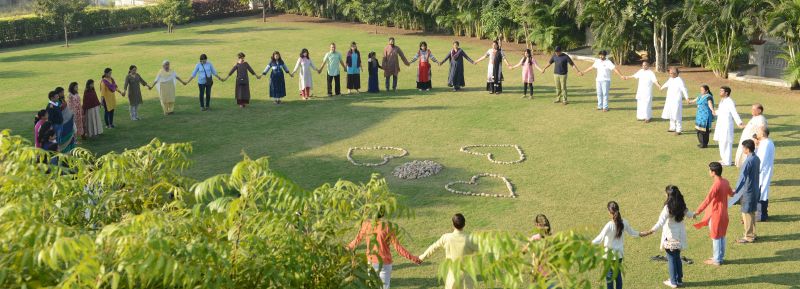
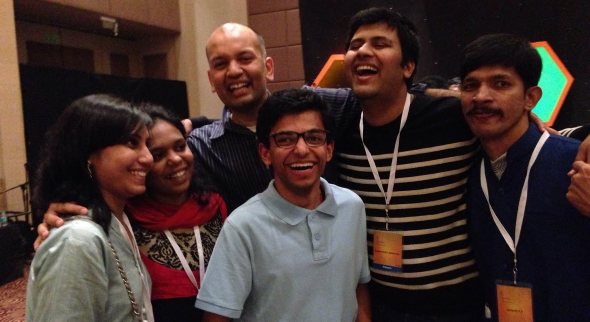
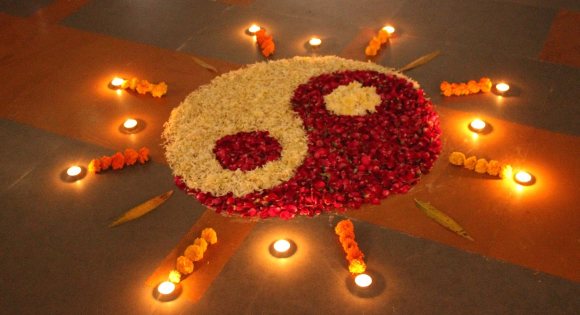
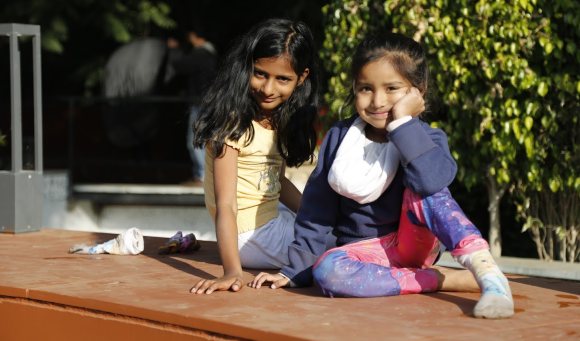
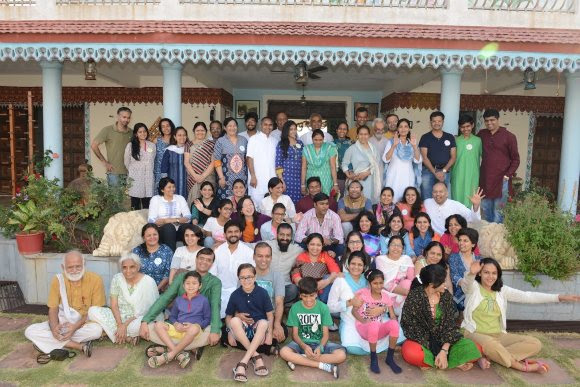
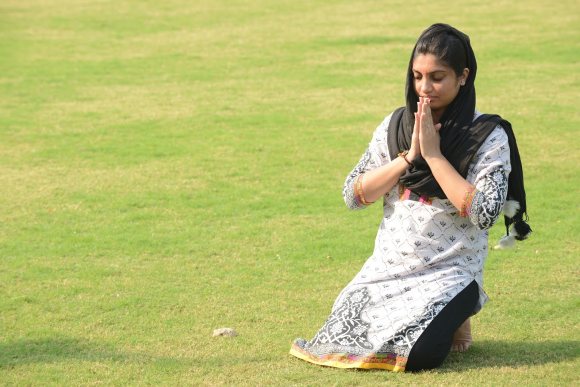
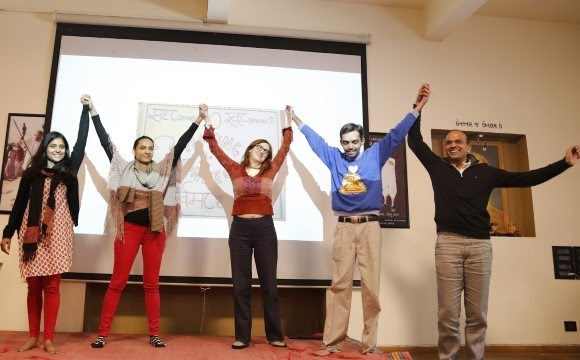
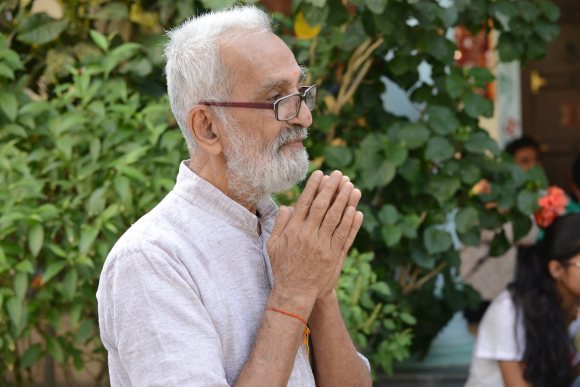
On Dec 30, 2015 Ward wrote:
Post Your Reply